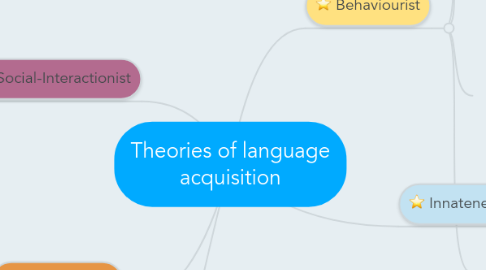Theories of language acquisition
저자: JUAN DAVID PEREZ RODRÍGUEZ


1. Cognitive
1.1. construction of the world
1.1.1. Through experience
1.1.1.1. Cognition
2. Social-Interactionist
2.1. influence by the enviroment and others
2.2. language is only acquire by interaction with others
2.3. children needs guidness
2.3.1. Zone of Proximal Development
2.3.2. Scaffolding
3. Usage-Based
3.1. children learn by expirience
3.2. language emerge form language use
3.2.1. frecuancy of use
4. Behaviourist
4.1. Language as a cognitive behaviour
4.2. classical and operational condition
4.2.1. Classical condition
4.2.1.1. conditional stimulus
4.2.1.1.1. reaction of an act or something
4.2.1.2. inconditional stimulus
4.2.1.2.1. answer to future similar situations
4.2.2. operational condition
4.2.2.1. Positive
4.2.2.1.1. reinforcement
4.2.2.1.2. punishment
4.2.2.2. negative
4.2.2.2.1. reinforcement
4.2.2.2.2. punishment
4.3. imitation
4.3.1. Children acquire language by reproducing what they hear
4.4. Reinforcement
4.4.1. Children acquire language because they are rewarded and corrected by adults
5. Innateness
5.1. noah chomsky
5.1.1. Language adquisition device
5.1.2. Language is an innate faculty
5.1.3. Universal grammar
5.1.4. Critical period hypothesis

